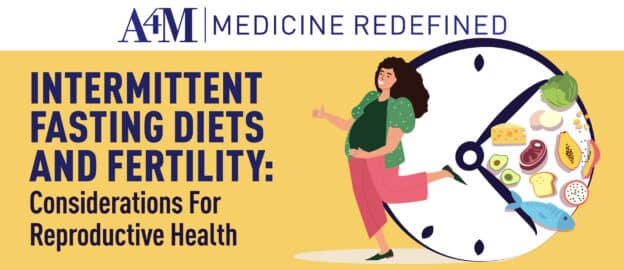Evidence-based health benefits of fasting diets include improved cellular repair, gene expression, and metabolic rate; reduced insulin resistance, oxidative stress, inflammatory markers, and blood glucose levels. Some studies have even suggested that IF may boost fertility.
However, emerging evidence suggests that the risks associated with this type of nutritional pattern may greatly outweigh the benefits in specific populations, particularly those attempting to conceive.
A study published earlier this year found that time-restricted eating had adverse effects on the quality of sperm and eggs and that these effects continued after regular feeding patterns resumed.
Fasting and Fertility in Zebrafish
New research from the University of East Anglia (UEA) published in Proceedings of the Royal Society B aimed to elucidate how fasted animals utilize resources upon resuming a normal diet and how such interventions impact somatic growth and repair, gamete quality, and reproductive health.
To conduct their examination, researchers used small tropical fish, Danio rerio (zebrafish), which share more than 70% of their genome with humans. This type of fish is frequently used for research purposes due to their small size, ability to live happily in captivity, and rapid breeding.
All the fish used in the study were of reproductive age and had been fed an unrestricted diet before the experiment. Two cohorts were created, one which continued with the unrestricted diet and the other which fasted. After the 15-day trial period, the team returned all fish to their previous diet and assessed somatic growth and reproductive performance.
No difference in somatic growth was reported between the two cohorts; however, the female fasted fish showed faster fin growth upon returning to an unrestricted diet.
Reproductive Health Declines
The research team reported significant effects of fasting on reproductive health in both male and female zebrafish.
Total offspring numbers were reduced in fasting females compared to the control group. Though this rebounded once re-feeding began, researchers observed a troubling difference in offspring quality both during and after the fasting period, indicating an impact on egg quality.
Specifically, fasted females initially produced fewer but higher-quality offspring. However, once feeding resumed, their offspring quantity increased, but their survival rate declined.
The study’s authors observed a similar pattern in fasted males. Sperm velocity and 24-hour post-fertilization offspring survival rates worsened during fasting and remained impaired after feeding resumed.
Overall, gamete quality in both sexes appeared negatively impacted by fasting, with these effects persisting even after regular feeding patterns resumed.
Results and Need for More Human-Specific Research
Dr. Edward Ivimey-Cook, from UEA’s School of Biological Sciences, discussed the results in a ScienceDaily article: “What we found is that time-restricted fasting affects reproduction differently in males and females. Once the fish returned to their normal feeding schedule, females increased the number of offspring they produced at the cost of egg quality resulting in reduced offspring quality. The quality of male sperm also decreased.
“These findings underscore the importance of considering not just the effect of fasting on body maintenance but also on the production of eggs and sperm.
“Importantly, some of the negative effects on eggs and sperm quality can be seen after the animals returned to their normal levels of food consumption following time-restricted fasting.”
Additionally, the researchers suggest that their findings indicate food restriction led fish to invest resources in body maintenance and survival over reproduction. They underscore the importance of considering reproductive health impacts when evaluating longevity interventions, such as intermittent fasting. They suggest further careful assessment of IF’s effects on fertility, though caution that these zebrafish findings cannot be directly extrapolated to humans.
More Questions to Be Answered
Experts have voiced concerns about drawing premature connections from these fish models to human applications. Further research is greatly needed; to date, there have been few studies of time-restricted eating’s influence on fertility and reproductive health, with most conducted in rodents.
As the study’s corresponding author Professor Alexei Maklakov notes, “But the way organisms respond to food shortages can affect the quality of eggs and sperm, and such effects could potentially continue after the end of the fasting period.”
This key result highlights the need for more human research before promoting IF as compatible with reproductive goals.
Overall, while more investigation is required, this work indicates potential risks of fasting that require consideration – especially for those trying to conceive. The lasting effects observed merit further exploration regarding IF’s impacts on fertility.
Infertility: A Growing Global Crisis
A staggering 1 in 6 adults across the globe experience infertility, or nearly 20% of the population, according to data from the World Health Organization. Both female and male fertility rates have fallen drastically over the past few decades. Stemming from diverse factors, such as hormonal imbalances, lifestyle patterns, and increased parental age, infertility has become a growing global public health crisis threatening sustainable population levels.
While research continues to uncover links between reproduction and therapeutic targets, including hormones, ovarian function, and sperm quality, critical solutions from prevention to treatment remain inaccessible for countless patients worldwide. The magnitude of this crisis necessitates urgent action to expand the availability of high-quality, evidence-based fertility education to advance fertility care and reverse the downward trend. Investing in clinical training, healthcare capabilities, and public awareness is vital to securing our sustainable future.
A4M’s first-of-its-kind Fertility Certification Course equips health professionals with a comprehensive education to meet the skyrocketing demand for evidence-based fertility therapies. This course covers cutting-edge techniques from IVF to epigenetic modulation to fertility preservation and rejuvenation. Participants will master fertility diagnostics, develop integrated treatment plans, and understand the critical health components involved in infertility. With insights from interactive case studies and leading experts, professionals will be prepared to leverage the latest knowledge to improve their patients’ reproductive success.
Learn more about the upcoming course by clicking here.




